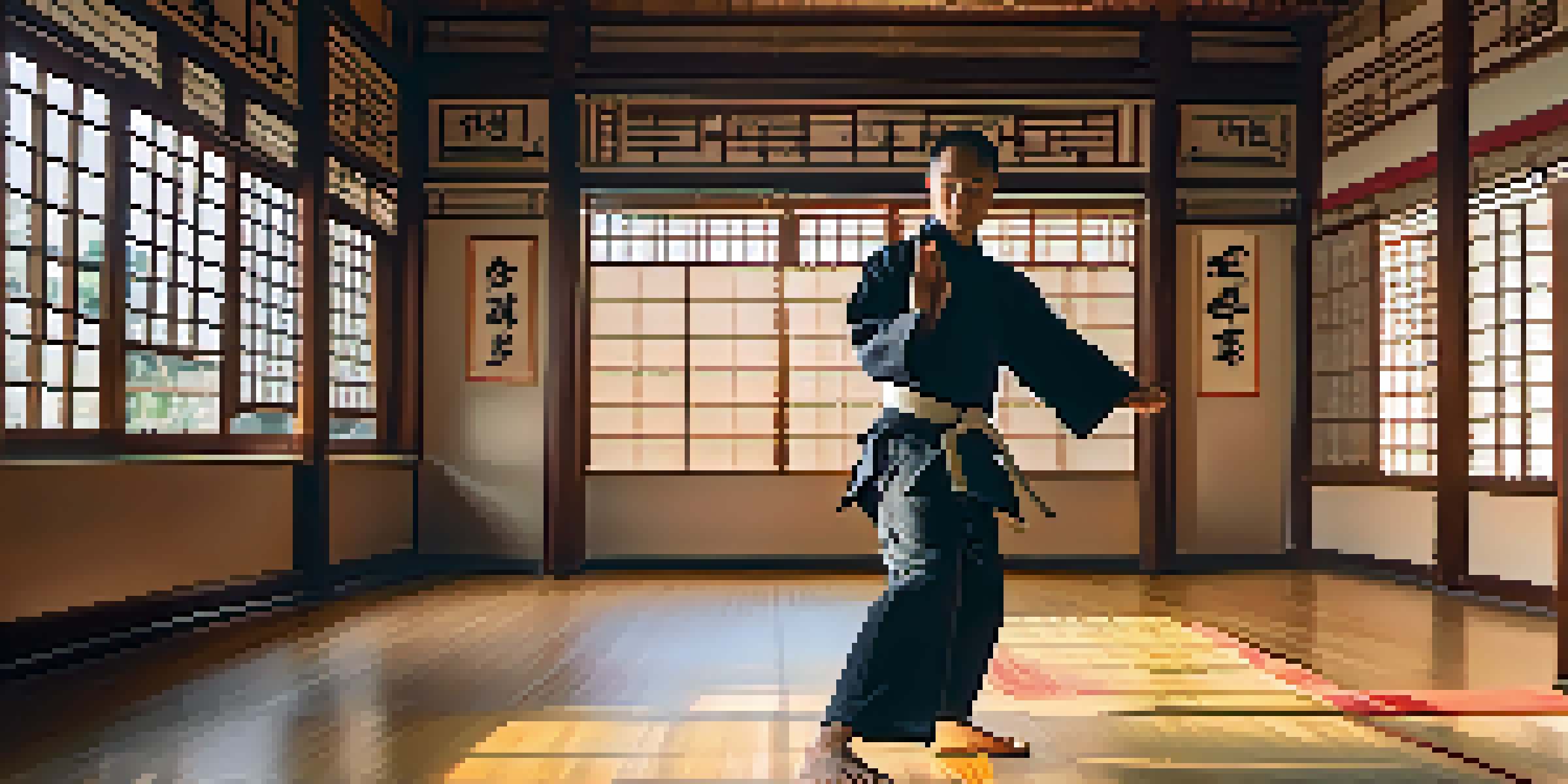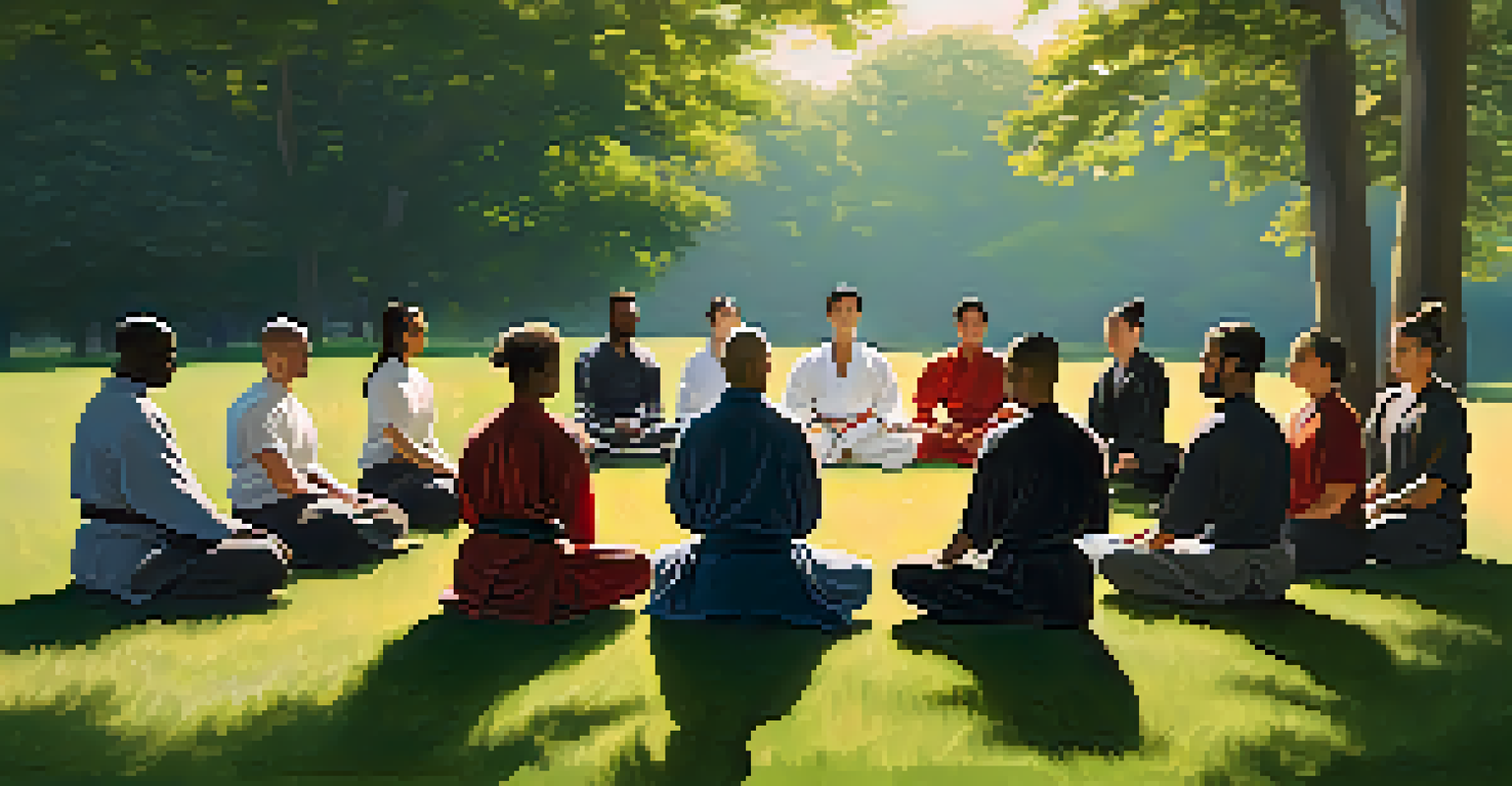Mindfulness in Martial Arts: A Path to Mental Health Awareness

Understanding Mindfulness in Martial Arts Practice
Mindfulness, in its simplest form, is the art of being present. In martial arts, this means fully engaging with each movement, breath, and sensation during practice. It's about tuning in to the body and mind, allowing practitioners to cultivate a deeper awareness of themselves and their surroundings.
The mind is everything. What you think you become.
Martial arts styles, from karate to tai chi, integrate mindfulness through focused movements and breathing techniques. As students learn to concentrate on their actions, they can reduce distractions and enhance their performance. This deep connection between mind and body can lead to profound insights and personal growth.
Incorporating mindfulness into martial arts can also foster emotional resilience. Practitioners often find that by centering their thoughts, they become better equipped to handle stress and anxiety, which is essential in today's fast-paced world.
The Benefits of Mindfulness for Mental Health
Engaging in mindfulness practices has been shown to improve mental health by reducing symptoms of anxiety and depression. When martial artists focus on their movements and breathing, they can create a mental space that promotes relaxation and clarity. This can be particularly beneficial for individuals dealing with emotional challenges.

Martial arts training often includes techniques for managing stress, such as controlled breathing and visualization. These techniques can help practitioners develop coping strategies that extend beyond the dojo. As a result, they can navigate daily pressures with greater ease and confidence.
Mindfulness Enhances Martial Arts
Practicing mindfulness in martial arts helps individuals connect deeply with their movements, leading to improved focus and performance.
Moreover, the community aspect of martial arts encourages social connections, which are vital for mental well-being. Practicing mindfulness in a group setting can foster a sense of belonging, further enhancing emotional health and resilience.
Mindfulness Techniques in Martial Arts Training
Various mindfulness techniques can be seamlessly woven into martial arts training. For instance, focused breathing exercises can ground practitioners and enhance their concentration. These exercises help to clear the mind and increase awareness, both essential for effective training.
It's not the load that breaks you down, it's the way you carry it.
Another technique involves body scans, where practitioners pay attention to different parts of their bodies. This promotes a deeper understanding of physical sensations and can help identify areas of tension or discomfort. By practicing awareness in this way, students can improve their form and prevent injuries.
Visualization is also a powerful tool in martial arts. By mentally rehearsing techniques or scenarios, practitioners can enhance their performance while building confidence. This practice not only aids in skill development but also reinforces the mind-body connection.
Cultivating Focus and Concentration
Mindfulness training in martial arts emphasizes the importance of focus and concentration. As students learn to concentrate on their movements, they develop the ability to block out distractions in their environment. This skill translates well into everyday life, helping individuals manage their attention more effectively.
For example, during a sparring session, a practitioner must remain fully present to anticipate their opponent's moves. This heightened state of awareness enhances performance and fosters quick decision-making. Over time, this practice can cultivate a sharper mental focus that benefits both martial arts training and personal endeavors.
Boosting Mental Health Through Practice
Mindfulness techniques in martial arts contribute to better mental health by reducing anxiety and fostering emotional resilience.
Additionally, the discipline required in martial arts encourages practitioners to stay committed to their goals. This sense of purpose can boost self-esteem and motivate individuals to tackle challenges with determination, further enriching their mental health.
Mindfulness as a Tool for Emotional Regulation
Martial arts training often involves facing opponents, which can trigger various emotions, including fear and frustration. Mindfulness equips practitioners with tools to manage these feelings effectively. By recognizing and acknowledging their emotions, individuals can respond rather than react impulsively.
For instance, a martial artist might feel anger during a sparring match. Through mindfulness, they can take a moment to breathe, allowing themselves to process this emotion before acting. This practice can lead to more composed and strategic responses rather than rash actions driven by emotion.
Ultimately, learning to regulate emotions through mindfulness can improve interpersonal relationships and communication both on and off the mat. This emotional intelligence is a valuable asset in navigating life's complexities.
Building Resilience Through Mindfulness
Resilience is the ability to bounce back from setbacks, and martial arts training inherently fosters this quality. By consistently facing challenges and learning to overcome them, practitioners build mental toughness. Mindfulness enhances this process by encouraging reflection on experiences, both positive and negative.
Practitioners learn that failure is part of growth, which is essential for developing resilience. Through mindfulness, they can approach setbacks with a sense of curiosity rather than defeat. This shift in perspective can empower individuals to view challenges as opportunities for growth.
Resilience Builds Through Mindfulness
Martial arts training cultivates resilience by encouraging practitioners to view challenges as opportunities for growth.
As martial artists cultivate resilience, they also develop a greater sense of self-efficacy. This belief in their capabilities can extend beyond martial arts, leading to increased confidence in everyday life and the ability to handle adversity with grace.
Mindfulness in Everyday Life Beyond the Dojo
The benefits of mindfulness learned through martial arts can extend far beyond the training ground. Practitioners often find that their ability to remain present and focused enhances various aspects of their lives, from work to personal relationships. This holistic approach to mindfulness can create a ripple effect of positive change.
For example, individuals may apply mindfulness techniques when facing stressful situations at work. By practicing deep breathing and focusing on the present moment, they can reduce anxiety and improve their decision-making. This mindful approach can transform challenging situations into opportunities for growth.

Ultimately, integrating mindfulness into daily life fosters a greater sense of well-being. As martial artists carry these skills into their interactions and experiences, they contribute to a healthier, more balanced lifestyle.